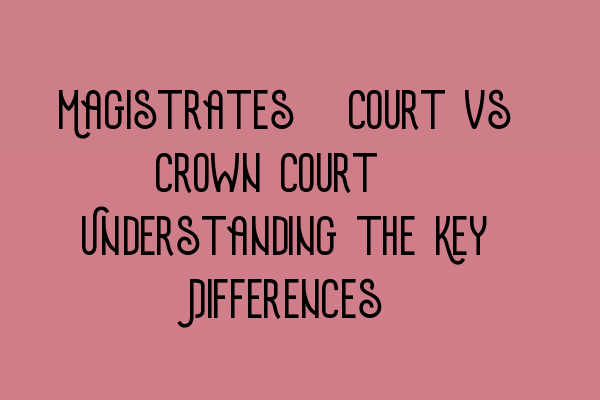Magistrates’ Court vs Crown Court: Understanding the Key Differences
The criminal justice system in the United Kingdom is structured in a way that ensures a fair trial for everyone. Two prominent courts in this system are the Magistrates’ Court and the Crown Court. While both courts play a vital role in the administration of justice, they have distinct differences in terms of jurisdiction, procedures, and sentencing. In this blog post, we will explore the key differences between the Magistrates’ Court and the Crown Court.
1. Jurisdiction
The Magistrates’ Court is the lower court in the criminal justice system. It deals with less serious criminal offenses, such as petty theft, minor assaults, and traffic violations. The Crown Court, on the other hand, handles more serious cases, including indictable offenses such as murder, rape, and robbery. The Crown Court also has jurisdiction over cases that have been committed for sentencing by the Magistrates’ Court.
2. Legal Representation
In the Magistrates’ Court, defendants can choose to represent themselves or be represented by a solicitor or a barrister. Legal aid is available for those who meet the eligibility criteria. In the Crown Court, the accused is entitled to have legal representation, and it is common for complex cases to have both a solicitor and a barrister.
3. Trial Procedures
In the Magistrates’ Court, trials are usually heard by a panel of three magistrates, also known as justices of the peace. These magistrates are not legally qualified and rely on the advice of a legally qualified court clerk. In the Crown Court, trials are presided over by a judge who has the authority to make legal rulings and determine the sentence if the accused is found guilty.
4. Sentencing Powers
The Magistrates’ Court has limited powers when it comes to sentencing. They can impose fines, community orders, and custodial sentences of up to six months. The Crown Court, on the other hand, has broader sentencing powers and can impose longer custodial sentences, including life imprisonment for the most serious offenses.
5. Appeals
Both the Magistrates’ Court and the Crown Court allow the right to appeal against decisions. Appeals from the Magistrates’ Court are heard in the Crown Court, and appeals from the Crown Court are usually heard in the Court of Appeal.
Understanding the key differences between the Magistrates’ Court and the Crown Court is essential for anyone involved in the criminal justice system. Whether you are a defendant, a witness, or a legal professional, knowing which court is responsible for which cases and the respective procedures can help you navigate the system more effectively.
At SQE Criminal Law & Practice Law UK, we provide comprehensive preparation courses for SQE 1 and SQE 2 exams. To enhance your understanding of criminal law and court procedures, we recommend practicing with our SQE 1 Practice Exam Questions and SQE 1 Practice Mocks FLK1 FLK2. Stay updated with the latest SRA SQE Exam Dates as well.
